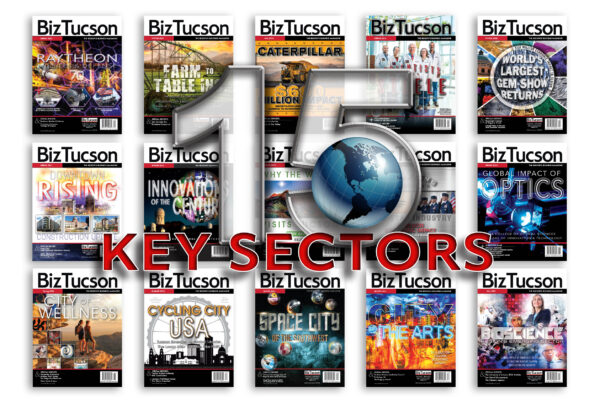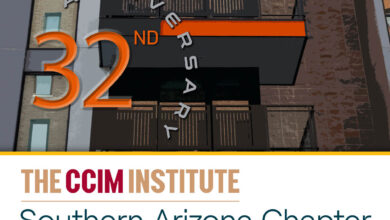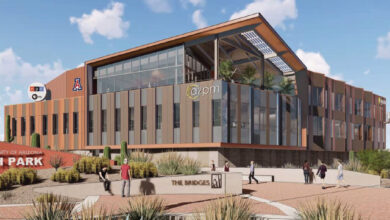
2. Aerospace & Defense Mega Region
By Rodney Campbell
The Tucson region is a vital and global hub for the aerospace and defense industries.
The economic impacts are staggering with more than 200 companies located here and a region that’s home to the fifth-highest concentration of aerospace and defense employees in the country.
“Aerospace and defense companies offer high wages, at every level, for all our citizens,” Joe Snell, president and CEO of Sun Corridor Inc., told BizTucson in 2022. “These industries lead to a stronger economic foundation for all.”
More than a century after the industries discovered Southern Arizona’s hospitable climate, local and national companies continue to make news. In fact, Tucson is ranked a top 10 metro for aerospace manufacturing due to its highly concentrated aerospace product and parts manufacturing sector, according to Sun Corridor Inc.
Raytheon, an RTX business, is the largest private employer in Southern Arizona and a true kingpin of our economy, with more than 70 years here. With a Tucson campus of more than 12,000 employees, Raytheon provides the most advanced solutions to detect, track and engage threats in the air, land, sea, space and more. In addition to its sprawling campus, the company opened a new engineering office last year at University of Arizona Tech Park to foster collaboration and develop new talent.
“We’ve created a hub of technology right here in our backyard in Tucson, Raytheon President Wes Kremer told BizTucson in 2022. After leading the company in many capacities since 2003, Kremer retires this year and Phil Jasper succeeds him as president.
In recent news, an interceptor built at Raytheon’s Tucson headquarters successfully destroyed an intermediate-range ballistic missile in testing. The company also announced it’s designing, building and testing high-power microwave antenna systems for the U.S. military.
The U.S. Air Force awarded Raytheon a contract to produce and deliver more than 1,500 StormBreaker smart weapons. StormBreaker is an air-to-surface, network enabled weapon that can engage moving targets in all weather conditions.
In addition to Raytheon, our region is home to numerous aviation companies with global assets, including Ascent Aviation Services, Bombardier, Parker Meggitt, Sargent Aerospace & Defense, FreeFall Aerospace, Universal Avionics, MHIRJ Aviation Group and more.
Ascent Aviation Services has two facilities in Southern Arizona, in Marana and near Tucson International Airport, where the company delivers heavy maintenance, repair and overhaul services for aircraft. Bombardier’s Tucson Service Centre, which is closing in on 50 years here, is maintaining and refurbishing business aircraft and regional jets–one of only a few locations on the continent that is a one-top shop. Founded in 1920, Sargent has supported the aerospace and defense industry by manufacturing specialty bearings products from its 155,000-square-foot campus in Tucson.
FreeFall Aerospace develops antenna technology for satellite communications, fixed and mobile ground stations, aerial platforms and a variety of commercial and government applications. It was recently accepted into the 2024 National Security Innovation Network Emerge Accelerator program, which connects Department of Defense mission partners with emerging technology teams and startups at the nation’s top research universities.
“As a company dedicated to developing low-cost antenna technology for ground and space applications, being a part of the Emerge Accelerator is a tremendous opportunity to showcase our innovative solutions and contribute to advancing technology for civilian and military markets,” FreeFall Aerospace CEO Dan Geraci said.
Universal Avionics, a subsidiary of defense giant Elbit Systems Ltd., focuses its technology on pilot safety. Its 165,000-square-foot corporate headquarters in Tucson is home to electronic assembly, test and repair facilities, which build and support its avionics products for customers around the world.
MHIRJ recently made headlines with its renewed commitment to Tucson. The MRO provider to airline fleets globally is planning to expand its workforce at Tucson International Airport by adding 100 jobs this year, and more than 250 over the course of three years.
“This expansion demonstrates the confidence MHIRJ has in the value proposition of Tucson as a leader in the aerospace and aviation industry,” said Snell of Sun Corridor Inc.
Finally, fueling the aviation talent pool here is Pima Community College, which operates its Aviation Technology Center near the airport. A $21 million expansion just two years ago more than doubled the state-of-the-art facility from 35,000 square feet to 87,000 square feet and adds a second hangar large enough for large commercial aircraft, five new classrooms, five new labs, a new tool crib, break room and new offices for the administrative team.






